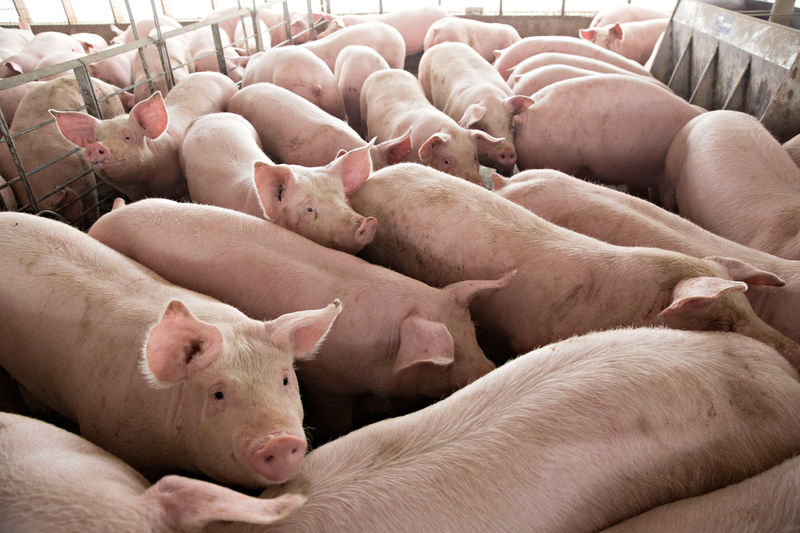By David Alire Garcia and Miguel Gutierrez
MEXICO CITY (Reuters) - Mexico put tariffs on American products ranging from steel to pork and bourbon on Tuesday, retaliating against import duties on metals imposed by President Donald Trump and taking aim at Republican strongholds ahead of U.S. congressional elections in November.
Mexico's response further raises trade tensions between the two countries and adds a new complication to efforts to renegotiate the NAFTA trade deal between Canada, the United States and Mexico.
American pork producers, for whom Mexico is the largest export market, were dismayed by the move.
Trump last week rattled some of the closest U.S. allies by removing an exemption to tariffs on imported steel and aluminum that his administration had granted to Mexico, Canada and the European Union.
Meanwhile, Trump advisor Larry Kudlow revived the possibility on Tuesday that the president will seek to replace the trillion dollar North American Trade Agreement (NAFTA) with bilateral deals with Canada and Mexico, a move that both countries say they oppose.
Following news of the new Mexican tariffs, which take effect immediately, the peso
Mexico's retaliatory list included a 20-percent tariff on U.S. pork legs and shoulders, apples and potatoes and 20 to 25 percent duties on types of cheeses and bourbon, the Mexican economy ministry said in the government's official gazette.
A range of U.S. steel products will be hit by 25 percent tariffs. Mexico is a net importers of U.S. steel.
Mexico’s trade negotiators designed the list, in part, to include products exported by top Republican leaders' states, including Indiana where Vice President Mike Pence was formerly governor, according to a trade source familiar with the matter.
The retaliatory tariffs could also have political implications in some hotly contested races as the Republicans seek to maintain control of both chambers in Congress. Pork exporter Iowa, where incumbent Republican Representative Rod Blum is seen as vulnerable in November's election, is an example of a place where Trump's party could be hurt.
Top cheese producing states include California, New York and Wisconsin – home to House of Representatives Speaker Paul Ryan, who is retiring from Congress. Bourbon-producing Kentucky is the home state of Senate Majority Leader Mitch McConnell, a Republican.
'DEVASTATING' TO RURAL AMERICA
"This is a gut punch to Virginia farmers, who exported more than $68 million in pork to Mexico last year. The President’s trade war is going to cost Virginia ag jobs," U.S. Senator Mark Warner, a Democrat from Virginia, said in a tweet.
The president of the U.S. National Pork Producers Council said Mexico accounted for nearly 25 percent of all pork shipments last year, adding that "a 20 percent tariff eliminates our ability to compete effectively in Mexico."
“The toll on rural America from escalating trade disputes with critically important trade partners is mounting," said Jim Heimerl, the council's president and a pork producer from Johnstown, Ohio. "This is devastating to my family and pork producing families across the United States," he said in a statement.
Mexico announced its response to Trump's move last week with a focus on products from congressional districts that Trump's Republican party is fighting to retain in November. It did not provide details of tariff levels or a full list of products at the time.
The United States and Mexico do $600 billion in annual trade and about 16 percent of U.S. goods exports go to its southern neighbor. However, the Mexican economy relies more on trade than does the U.S. economy, with about 80 percent of its exports sold to America.
The trade fights with Mexico and Canada are part of the Trump administration's "America First" economic agenda, an aggressive policy of seeking to set right what the president views as unfair trade balances that has also put Washington on a collision course with China over trade.
Washington and Beijing have threatened tit-for-tat tariffs on goods worth up to $150 billion each, as Trump has pushed Beijing to open its economy further and address the United States' large trade deficit with China.
The United States imposed tariffs of 25 percent on imported steel and 10 percent on aluminum in March, citing national security grounds. Last week Washington said it was moving ahead with the metals tariffs on imports from Canada, Mexico and the European Union, ending a two-month exemption.
The dispute with Mexico over tariffs makes it more difficult to conclude months of talks on renegotiating NAFTA between the three countries, talks that began last year because Trump said the deal needed to be reworked to better serve the United States. Canada has also strongly objected to the metals tariffs.
The U.S. side has linked lifting its tariffs to a successful outcome of the NAFTA negotiations.
Mexico's economy ministry said on Monday it would start a dispute settlement process at the World Trade Organization over the U.S. tariffs, joining the European Union in seeking WTO involvement against the new measures.
Separately, Mexico took steps on Tuesday to make it more attractive for other countries to send it pork by opening a tariff-free quota for some pork imports.

Mexican Economy Minister Ildefonso Guajardo said his country would now "surely" look to Europe for pork products, used in many traditional dishes in Mexico.